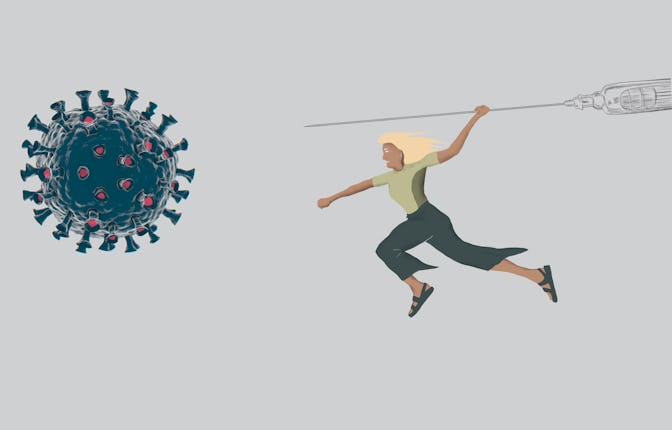Here's who should be last in line for that booster shot
If you fall into this group, you won’t likely need the extra protection — yet.

Some of y’all have superhero-esque powers against COVID and it shows. Okay, it might not show but many well-informed experts assert that if you had COVID and were also vaccinated a few months later, you have an extra layer of protection against coronavirus — even the more contagious variants. That being said, you should probably be last in line for that third booster shot.
In an article published in the Wall Street Journal this week, Akiko Iwasaki, an immunologist at Yale, said that the immune response from a previous COVID infection serves as a sort of stand-in for a third booster because a person in that scenario already had "three exposures.” In fact, studies have shown that 95% of people who recover from COVID had “durable memories from the virus” as long as eight months later, according to the National Institutes of Health. Those individuals are the ones who are the least likely to get sick from new variants, per Insider.
Talk of giving vaccinated Americans third jabs began when Delta swept the country this summer. Scientists found that the strain was able to evade vaccine immunity more effectively than previous iterations and breakthrough infections became more common. Vaccines remained largely successful at preventing hospitalizations and death, which is why everyone was excited about boosters. Everyone, except the exceptionally ethics-minded World Health Organization, which recommended halting third booster shots for healthy people until next year. The admirably compassionate experts at WHO are concerned because around half of the world hasn’t even received a first dose of the vaccine. I get it. Americans aren’t the only humans that matter.
Even if it’s the right call, the WHO’s reluctance to give us our boosters shook some of us; studies have found that vaccinated people begin to lose their defensive antibodies four to six months after their shots, according to Nature. This is where the added protection of a previous COVID infection becomes particularly relevant.
But what about those of us who had breakthrough COVID infections after we got vaccinated? Although most studies focus on people who were infected before they were inoculated, there’s good reason to believe that those of us who had it in the reverse order are also protected. A majority of breakthrough infections in the U.S. this summer were of the Delta strain, which means those of us who got sick over the summer might have developed Delta-specific antibodies on top of our existing vaccine immunity.
Even though it might suck to think that we will likely get our booster shots last, we can rest assured that it’s for good reason: We probably don’t need them right now, according to some pretty reputable people. As new variants spread among the unvaccinated, it’s most important that people who still haven’t been inoculated get their first shots before we start getting our third. In the meantime, it’s kind of nice to think that my COVID and Pfizer antibodies are working together, probably holding hands in my immune system as I type, like some big antibody Coachella.